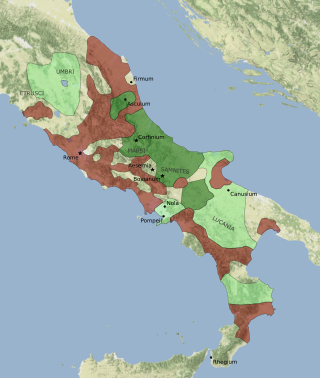
Marcus Antonius, commonly known in English as Mark Antony, was a Roman politician and general who played a critical role in the transformation of the Roman Republic from a constitutional republic into the autocratic Roman Empire.
This article concerns the period 39 BC – 30 BC.

This article concerns the period 49 BC – 40 BC.
80s BC is the time period from 89 BC – 80 BC.

Lucius Cornelius Sulla Felix, commonly known as Sulla, was a Roman general and statesman. He won the first large-scale civil war in Roman history and became the first man of the Republic to seize power through force.

The Social War, also called the Italian War or the Marsic War, was fought largely from 91 to 87 BC between the Roman Republic and several of its autonomous allies in Italy. Some of the allies held out until 87 BC.
Gnaeus Pompeius Strabo was a Roman general and politician, who served as consul in 89 BC. He is often referred to in English as Pompey Strabo, to distinguish him from his son, the famous Pompey the Great, or from Strabo the geographer.

The gens Pompeia was a plebeian family at ancient Rome, first appearing in history during the second century BC, and frequently occupying the highest offices of the Roman state from then until imperial times. The first of the Pompeii to obtain the consulship was Quintus Pompeius in 141 BC, but by far the most illustrious of the gens was Gnaeus Pompeius, surnamed Magnus, a distinguished general under the dictator Sulla, who became a member of the First Triumvirate, together with Caesar and Crassus. After the death of Crassus, the rivalry between Caesar and Pompeius led to the Civil War, one of the defining events of the final years of the Roman Republic.
Publius Ventidius was a Roman general and one of Julius Caesar's protégés. He won key victories against the Parthians which resulted in the deaths of key leaders – victories which redeemed the losses of Crassus and paved the way for Antony's incursions. According to Plutarch in his "Life of Antony", the three military victories of Ventidius over the Parthians singularly resulted in the only award to a Roman general of the triumphal ceremony for victory over Parthians.
Lucius Julius Caesar was a Roman statesman and general of the late 2nd and early 1st centuries BC. He was involved in the downfall of the plebeian tribune Lucius Appuleius Saturninus in 100 BC. He was consul of the Roman Republic in 90 BC during the Social War. During the war he commanded several Roman legions against the Italian Allies. He was awarded a Triumph for his victories on the Samnites at Acerrae.

Quintus Labienus Parthicus was a Roman general in the Late Republic period. The son of Titus Labienus, he made an alliance with Parthia and invaded the Roman provinces in the eastern Mediterranean which were under the control of Mark Antony. He occupied the Roman province of Syria together with the Parthians in 40 BC. He then pushed into southern Anatolia, still with Parthian support. The main Parthian force took charge of Syria and invaded Judea. Both Labienus and the Parthians were defeated by Publius Ventidius Bassus, who recovered these provinces for Mark Antony.
Titus Afranius, Afrenius, or Lafrenius, who was not a Roman, was one of the leaders of the Italian confederates in the Social war in 90 BC. At Mount Falerinus he united with Judacilius and Publius Ventidius Bassus and defeated the legate Pompeius Strabo, and pursued him into Firmum, after which the three went their separate ways. Afranius besieged Strabo within the walls of the city. Strabo, on hearing another army was approaching, sent out Publius Sulpicius Rufus to attack Afranius' force from behind while he mounted a frontal assault. The battle proceeded evenly until Sulpicius managed to set fire to Afranius' encampment. Afterwards Afranius' forces fled to Asculum without a leader, as he had fallen at some time during the battle.
Gaius Judacilius or Gaius Vidacilius was a native of Asculum in Picenum, and one of the chief generals of the allies in the Social War, 90 BC. He was known to have been one of the ablest and most resolute leaders of the insurrection. He first commanded in Apulia where he was very successful: Canusium and Venusia, with many other towns, opened their gates to him, and some which refused to obey him he took by force. He executed the Roman nobles who were made prisoners, and enrolled the common people and slaves among his troops.

The gens Porcia, rarely written Portia, was a plebeian family at Ancient Rome. Its members first appear in history during the third century BC. The first of the gens to achieve the consulship was Marcus Porcius Cato in 195 BC, and from then until imperial times, the Porcii regularly occupied the highest offices of the Roman state.

The Picentes or Piceni or Picentini were an ancient Italic people who lived from the 9th to the 3rd century BC in the area between the Foglia and Aterno rivers, bordered to the west by the Apennines and to the east by the Adriatic coast. Their territory, known as Picenum, therefore included all of today's Marche and the northern part of Abruzzo.
This section of the timeline of Hispania concerns Spanish and Portuguese history events from the Carthaginian conquests to before the barbarian invasions.
The Roman–Dalmatian wars were a series of conflicts between the Dalmatae (Delmatae) and the Romans. After the fall of the Ardiaei in southern Illyria, the Dalmatae were to pose the greatest force against the Romans in their conquest of Illyria.
The Siege of Apamea was a failed attempt by the Caesarians near the end of Caesar's Civil War to capture the rebel city of Apamea, Syria Secunda. Lucius Statius Murcus and Quintus Marcius Crispus led the attempt to capture the city, while Equite Quintus Caecilius Bassus led the defence of the city.









